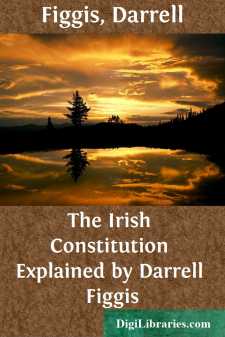Categories
- Antiques & Collectibles 13
- Architecture 36
- Art 48
- Bibles 22
- Biography & Autobiography 813
- Body, Mind & Spirit 142
- Business & Economics 28
- Children's Books 17
- Children's Fiction 14
- Computers 4
- Cooking 94
- Crafts & Hobbies 4
- Drama 346
- Education 46
- Family & Relationships 57
- Fiction 11829
- Games 19
- Gardening 17
- Health & Fitness 34
- History 1377
- House & Home 1
- Humor 147
- Juvenile Fiction 1873
- Juvenile Nonfiction 202
- Language Arts & Disciplines 88
- Law 16
- Literary Collections 686
- Literary Criticism 179
- Mathematics 13
- Medical 41
- Music 40
- Nature 179
- Non-Classifiable 1768
- Performing Arts 7
- Periodicals 1453
- Philosophy 64
- Photography 2
- Poetry 896
- Political Science 203
- Psychology 42
- Reference 154
- Religion 513
- Science 126
- Self-Help 84
- Social Science 81
- Sports & Recreation 34
- Study Aids 3
- Technology & Engineering 59
- Transportation 23
- Travel 463
- True Crime 29
The Irish Constitution Explained by Darrell Figgis
by: Darrell Figgis
Description:
Excerpt
Introduction
IRELAND AND A COMMUNITY OF NATIONS.
The articles that are now gathered together in this little book were first published in the Irish Independent at the invitation of its Editor. They were not written for publication in book-form; and they naturally suffer, in their present form, from the conditions that were first imposed on them, conditions proper to their original setting. With the exception of two of them, they were written rather in a spirit of exposition than in a spirit of analysis and criticism; and this intention was only departed from because it seemed that the two matters so dealt with departed, with differing degrees of flagrancy, from the original purpose of the Constitution, which was to make the mechanism of Government malleable at every stage to the will of the people of Ireland.
Whether one believes ardently in the faith that the will of a people should under all circumstances prevail, and that the forms of Government should at all times be submissive to that will, is indifferent. That is a question for the individual, with which I do not presume to interfere. One need only believe with l’Abbé Coignard that “a people is not susceptible to more than one form of government at the same period,” to believe, further, that if one asserts the derivation of all power and authority from the popular will, if that will be once fairly and honestly ascertained, it then follows that the will of the people is sufficient to itself, and that all forms of government must be made malleable to it. On that supposition, all frustrations and obstructions of, and impediments to, the constant exercise of that will must of necessity be cogs in the machinery of government; and for that reason in two articles I turned from exposition to criticism.
Apart from these two matters, I held to the essentials of exposition, without turning aside to criticism of details; and I based that exposition on the original plan and structure, which are preserved in the present draft, of the Constitution. It is right that the Fundamental Law of a State should be fully discussed and debated before it be enacted; and when that debate occurs criticism will find details enough to fasten upon. But at the present moment it is the essential plan that matters—not the feudal trumperies with which it is adorned, like stage jewels stuck upon a comely and decent garment, marring its simple truth, but not otherwise injuring its effectiveness for its purpose. And it was because it seemed to me that these two matters departed from the spirit of this essential plan, by placing important parts of the Judiciary and the Executive beyond the ready control of the people or the people’s representatives, that I dealt with them as I did. Apart from them I kept away from criticism.
Similarly I did not deal with certain matters anterior to the Constitution, in the light of which the Constitution can alone be understood. They lay out of sight of these articles, though they were essential to them, since they brought the Constitution, in its present form, into being....


